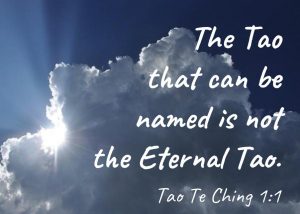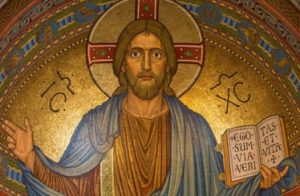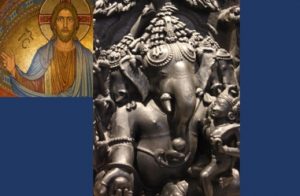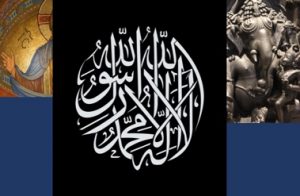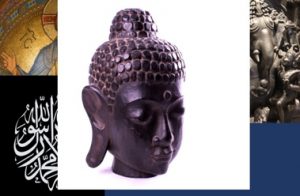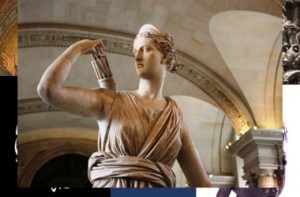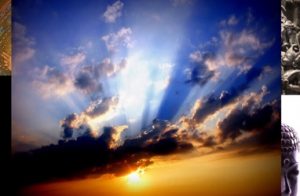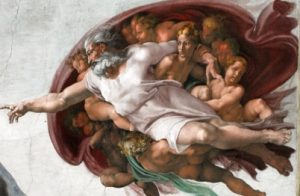Wrestling with “God”
Rev. Kevin Tarsa
Unitarian Universalist Community of the Mountains
A sermon delivered August 26, 2018
Reading “Couples Counseling” from Love Like Thunder by Jess Reynolds
Reading From Help, Thanks, Wow: The Three Essential Prayers by Anne Lamott(see http://thenervousbreakdown.com/tnbnonfiction/2012/11/excerpt-from-help-thanks-wow-by-anne-lamott/)
Wrestling with “God”
by Rev. Kevin Tarsa
Jacob’s Story – Genesis 32:22-31
In the first book of the Hebrew Bible there is a story of Jacob who is trying to return, at long last, to his childhood home and the brother from whom he has long been estranged. On the way home, after taking his family across, Jacob finds himself alone at the edge of a river, wrestling all night long with a mysterious figure.
 As dawn breaks, the unknown figure wrenches Jacob’s hip at the socket, wounding him permanently, such that forever after Jacob walks with a limp.
As dawn breaks, the unknown figure wrenches Jacob’s hip at the socket, wounding him permanently, such that forever after Jacob walks with a limp.
Jacob doesn’t give up the struggle, however, and keeps wrestling, looking for a hold.
“Let me go!,” the figure demands, but Jacob replies “I won’t let you go, unless you bless me.”
And the mysterious figure asks “What is your name?”
When Jacob answers, “Jacob,” the figure says, “Your name shall no longer be Jacob, but Israel, meaning “One who struggles with God.” Jacob asks, “Pray tell me your name.” And the figure says, “You must not ask my name,” and leaves.
Jacob named that place Peniel, meaning, “I have seen God Face to Face.”
Who’s here?
I have asked this before, and will again, but to get our bearings in this moment with each other:
- Who here has at some time in your life held a meaningful, helpful, important sense of God, whatever that meant to you?
- Who here has wrestled with that God, either in person or in concept?
- Who here currently holds a meaningful, helpful, important sense of god, whatever that means to you?
- Who here is currently wrestling with god or their concept of god?
- Who here has not ever in your life held a meaningful, helpful, important sense of god, whatever that meant to you?
- And who here rejects the concept of god entirely, finding it unnecessary, irksome and maybe a bit worrisome to have a focus on God here on a Sunday?
So, here we are!
Together.
Covering that entire range.
In the same tradition.
In the same Congregation.
Or at least in the same service in the same room this morning, acknowledging a diversity among us that we can ignore or that we can explore, that we can wrestle with together for the sake of our relationships, our spiritual depth, and the strength of our community. I’m inviting us to wrestle with this diversity throughout this year, to hear from many voices over time so that we may “cultivate our spiritual, emotional and intellectual strength.”
Last Sunday offered some of that wrestling in a wonderful service led by members of our Humanist group, who offered human centered approaches to life’s large questions and the mysteries of “life, the universe, and everything.”
Wrestling with notions of God has been central to our Unitarian and Universalist histories, Universalists rejecting the idea of an angry God who metes out eternal punishment, and the Unitarians rejecting the trinitarian notion of a god divided into three aspects or beings, questioning, eventually, the divine nature of the Bible and the divinity of Jesus, wrestlings that do not occupy the attention of many of our UU members these days.
Yet, many Unitarian Universalists continue to wrestle with the concept of god in some way, or with other people’s concept of god, at least, and with the usefulness of wrestling with any of it in the first place in this day and age.
Abner Kneeland’s Story
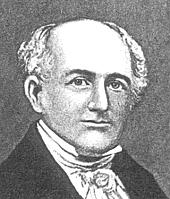 The last person to be jailed for blasphemy in the U.S. was a Universalist minister, Abner Kneeland.
The last person to be jailed for blasphemy in the U.S. was a Universalist minister, Abner Kneeland.
Massachusetts, 1838.
By then Abner Kneeland had been disowned and disfellowshipped by the Universalists, for his religious and his political views. He had called for equal rights for women and equality of races. He had suggested that women keep their own name and bank accounts. He had spoken out in favor of birth control, divorce, and interracial marriage. He was attracting 2000 people on Sunday mornings and on Wednesday evenings as lecturer for the First Society of Free Inquirers in Boston.
In 1833 he had printed a letter in which he stated: “Universalists believe in a god which I do not…” From this he was accused of being an atheist, and in his five trials on charges of blasphemy he argued grammar and punctuation in his defense.
Since there was no comma after “god”, he said, he wasn’t saying that he didn’t believe in god, just that he wasn’t believing in the same god in which the universalists believed. He also argued that he was not really an atheist, that he was a pantheist who believed that everything is god, that nature is god.
The courts didn’t buy either argument and Kneeland lost his case, serving 60 days in jail, likely more for his “dangerous” political views than anything. Though a person was convicted of blasphemy in the United States as late as 1928, and though some states still have blasphemy laws on the books, no one since Abner Kneeland has served time, officially, for blasphemy.
The absence of the comma and the question of grammar in Kneeland’s statement points in a helpful direction, for to enter any real conversation about god requires shared definitions.
What do we mean by “God?”
What do you, or I or anyone mean by “God?”
Traditional and tired wrestling matches about God begin with some variation on the dated definition of God that is shared by fundamentalist theists and fundamentalist atheists alike:
Rabbi Rami Shapiro says that arguing about whether this god exists – or any of its modern variations – is like arguing about unicorns. People agree on the definition of a unicorn. They simply disagree on whether unicorns exist or ever existed.
Reframing “God”
But liberal religionists in all traditions, and many of our Christian and Jewish neighbors, have long re-imagined god in much more metaphorical, often more mystical terms, explaining that we’ve kept the idea of God trapped in much too small a container.
Though the ago-old definition of God may yet be the god of some people, this is “not the god of serious, open minded thinkers,” says Jeanne H. Nieuwejaar. This is not the god we are likely to be wrestling with here among us.
The physicist, Murray Gellmann, once told Rabbi Irwin Kula, “Rabbi, I’m a scientist. I must tell you up front I don’t believe in God.” To which the rabbi replied, “That’s okay. I don’t believe in the God you don’t believe in either.” (Nieuwejaar 84)
With our ever-changing knowledge and awareness, people have long invested in re-conceptualized god, rescuing god from older notions that no longer serve, that chafe, or that contradict knowledge and experience, continuing to wrestle with god, determined to extract a blessing before they are willing to let go.
Many atheists and other non-theists ask, “Why? Why bother? Why not just let go? Why go through all that effort to try to get “God” to fit?
There are cultural reasons for such persistence: in the U.S. we and our neighbors and our families are steeped in God culture and language. And there is a natural human search for security, comfort and certainty in an intrinsically uncertain world, or as Mike Hogue puts it, in a “finally mysterious and morally ambiguous” universe (Hogue 120). There is also an evolutionary, psychological propensity to infer intent and order in the world, rather than randomness and chaos. It is our human nature.
Rooted in Experience
But in our setting, the holy ground for our conversations and empathy and compassion, if not always our understanding or agreement, is to be found, I think, in the priority our UU tradition places on personal experience as the primary source and filter for religious knowledge and truth.
At a certain level, experience equals truth for us.
We are asked to hold our views not because someone else holds them, or wrote them down, or told us to hold them, but because our personal experience in life leads us to hold them. Our truths must match our personal experience for us to have integrity.
The risk, of course, is that our experience can lead us to incorrect conclusions. Rabi Rami gives the simple, familiar examples of seeing a mirage of water on hot pavement or sand,
or a pencil that appears broken when seen in glass of water, or that primal experience of being startled by a piece of rope or a branch that we mistake for a snake. Our perception does not always have a complete basis in reality, but it is where we start. And then in our interactions with others we test and vet our perceptions.
The root experiences that keep a sense of god present and alive long after God was declared dead are the powerful transcendent experiences people have, like Jacob’s, alone at edge of the river. As our UUA sources name it, it is,
“Direct experience of that transcending mystery and wonder, affirmed in all cultures, which moves us to a renewal of the spirit and an openness to the forces that create and uphold life.”
In college, I was home on break one winter, snowshoeing in a cornfield behind my family’s home. In the depth of the blue in the sky, the chill of the air on my skin and in my nostrils, what was going on in my life, and the physical rhythm of walking on the snow, every cell in my body felt alive and pulsing. Charismatically Catholic at the time, I had a tremendous sense of God and Gods’ love permeating me and everything. It was expansive and exhilarating. Unexpected. Seemingly out of nowhere.
It’s the experience of mystery and awe Ursula Goodenough named in the reading last Sunday, of looking at the starry night sky, or looking through a microscope, when our perspective on our self and our place in the universe shifts.
Some of my favorite and strongest transcendent experiences involve human connectedness – music making, drumming, dancing together, laughing, crying, chanting, marching, singing… even holding silence together.
I’ve named before that when evangelical Christians talk about the presence of the holy spirit entering a room and group of people, I know exactly the experience they are talking about, even though I would now explain it in human, natural terms.
It is a physical experience for me. It is the powerful experience of sensing viscerally for a moment that we are connected to and part of something much larger, whether the universe, or time, or God. It’s an experience of feeling completely empty in Buddhist meditation, of everything dropping away leaving nothing, which is another form of unity and oneness.
Ice, Water, and Transcendence
Rabbi Shapiro offers the image of an ice cube in water.
Most of the time we see ourselves as the ice, different, distinct and separate from the water, but in powerful moments of transcendence, our sense of personal identity melts and we realize/feel/sense in that moment that we are entirely water, as is everything around us, and that we always have been water.
And then, because we can only sustain that so long, we go back to feeling separate, ice.
Most of the time human consciousness helps us make our way through the world this way, by making distinctions and delineating edges: What’s me/what’s not me? What’s this/what’s that? Our consciousness separates and categorizes, helps us locate all the edges. We need that to navigate the world.
But there are times when, for whatever reasons, our consciousness stops defining things for a moment, and when suddenly, without those boundaries delineated, all the distinctions fall away, leaving a potent experience of total connection, or total emptiness, or complete oneness.
…until at some point, the usual awareness returns and we become… ice again.
For me these are the foundational experiences of what we label “spiritual” or “religious.” Each of us will understand and interpret such experiences through our current lenses, lenses handed to us by our culture and those around us, as well lenses fashioned by our unique experiences and personality.
We’ll interpret our experience of transcendence as a feeling of oneness with the universe, as unconditional love and acceptance, as a higher state of human consciousness, as in interesting neurological experience, or as being held in the hand or the heart of God, for example.
Wordless
But because in the transcendent moment all distinctions and boundaries fall away, the experience itself is inherently wordless. Words define and delineate and so are unavailable in the midst of transcendence, and words are always inadequate to capturing or explaining it later, even to ourselves.
When Jacob asks, “Pray, tell me your name.” The mysterious figure answers, “You must not ask my name.”
There is no adequate answer.
Since words cannot truly capture the transcendent experience or the something larger of which we sense ourselves to be a part, we can only ever speak about them and point to them in symbol and metaphor that make sense to each of us, and even then, only incompletely.
“The Tao (the way) that can be named is not the Eternal Tao. (Tao Te Ching 1:1)
Thus, Ursula Goodenough’s covenant with mystery, letting the mystery be, without needing to filling in the blank spaces.
As Forrest Church put it, “God is our name for that which cannot be named or known.” (Nieuwejaar 93)
We who are atheists tend to think that god is an illusion, a mirage maintained by undisciplined minds, but, in our tradition, god is not an illusion, god is an allusion. “God” alludes to that which cannot be separated and named, even in a fully natural world.
As Anne Lamott suggests, “God is (simply) the name we might agree to use for convenience.”
And yet, I know, I know …the name “God” comes with a whole lot of baggage.
I myself am drawn to other symbols and words. But in this regard, we are diverse enough, in this very room, to benefit from wrestling with “god,” if we can.
Let’s Wrestle
I invite us to wrestle here with “God” not by starting with our beliefs, or our arguments of logic, or our pet peeves, which are usually dead ends for the beginning of such a conversation, but by sharing the stories of our transcendent experiences and what we make of them.
What are those boundary transcending experiences you have had, whether you label them wonderful mysteries, or God, or “unimaginably big and not us.”
Let’s be ready to listen to others with curiosity, rather than loaded for bear with our own convictions.
Start there, I say.
With our felt experiences.
Start there.
Without a comma.
I’m fond of a quote from Alice Walker in The Color Purple:
“…have you ever found God in church? I never did. I just found a bunch of folks hoping for him to show. Any God I ever felt in church I brought in with me. And I think all the other folks did too. They come to church to share God, not find God.”
A couple years ago, in the Davis UU congregation, the children played hide and seek with God on a Sunday morning much like this one.
They looked for God in nature.
They looked for God in human caring.
They looked for God in a mirror.
And finally, they looked for god in each other’s eyes, seeing God face-to-face.
Let’s start there.
So may we be.
Sources
Goodenough, Ursula. The Sacred Depths of Nature. New York: Oxford Univ. Press, 1998..
Hogue, Michael S. American Immanence: Democracy for an Uncertain World. New York: Columbia University Press, 2018.
Lamott, Anne. Help, Thanks, Wow: The Three Essential Prayers. New York: Riverhead Books/The Penguin Group, 2015.
Nieuwejaar, Jeanne Harrison. Fluent in Faith: A Unitarian Universalist Embrace of Religious Language. Boston: Skinner House Books, 2012.
Shapiro, Richard R. God: A Rabbi Rami Guide. Cork: BookBaby, 2013.
Walker, Alice. The Color Purple. 1982
